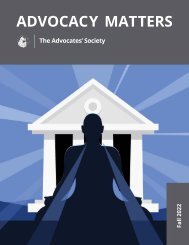Advocacy Matters - Spring 2024
Keep up to date on what your fellow Society members have to say in Advocacy Matters.
Keep up to date on what your fellow Society members have to say in Advocacy Matters.
You also want an ePaper? Increase the reach of your titles
YUMPU automatically turns print PDFs into web optimized ePapers that Google loves.
Dunn (two members of the three-person executive<br />
team leading the closure of Minden Gross<br />
LLP) and Norman Bacal (former managing partner<br />
of Heenan Blaikie LLP). We spoke about<br />
law firms and common trends more generally,<br />
as opposed to Minden Gross LLP and Heenan<br />
Blaikie LLP, in particular.<br />
Two common themes emerged in our discussions.<br />
First, without constant attention and focus, law<br />
firms can coast, losing a clear and common sense<br />
of direction over the years, especially when partners<br />
are making healthy money. “Ignorance is<br />
bliss,” says Sallese. “Nobody wants to have hard<br />
discussions when they are making money.” During<br />
a financial downturn, however, all the issues that<br />
could have, and should have, been proactively addressed<br />
previously can rear their ugly heads.<br />
Second, lawyers do not necessarily make the<br />
best leaders. In some law firms, the leaders are<br />
the highest billing partners. But excellence in<br />
attracting and providing legal services to clients<br />
does not necessarily translate into being an effective<br />
law firm manager. “How are managing<br />
partners chosen?” posited Bacal. “How many<br />
hold an MBA degree, or other leadership and<br />
management training? In what other company<br />
would you choose a CEO without leadership or<br />
management experience? Leadership doesn’t<br />
come naturally to everyone and in law schools,<br />
it isn’t taught.” Point taken.<br />
I suspect these themes are common for<br />
many other law firms who have yet to reach<br />
the breaking point. Sallese agrees, and wisely<br />
warns: “I genuinely believe that Minden Gross is<br />
the proverbial canary in the coal mine. If I could<br />
offer one piece of advice to law firms who may<br />
be in a similar situation, it is to look inward, get<br />
a hold of your finances and how each partner is<br />
compensated now while things are positive. Get<br />
your house in order.”<br />
What are some of the warning signs of a potential<br />
closure? “Partners having increased<br />
hushed meetings with one another behind<br />
closed doors,” notes Sallese. Another common<br />
theme is an unusual “quietness” in the firm.<br />
“Trust the staff,” says Bacal. If legal assistants<br />
and law clerks appear unusually stressed, there<br />
is a reason for it.” Another sign is unprecedented<br />
discussions or memos about “cost-cutting”<br />
measures, notes Dunn.<br />
Finally, with respect to advice to law firms<br />
who may find themselves on autopilot while<br />
still earning a healthy profit, Bacal stresses we<br />
need to revisit law firm culture. “The partnership<br />
needs to determine the culture they want.<br />
Is it ‘people over profits’, ‘teamwork over the<br />
individual’, a ‘churn and burn’ profit-maximizing<br />
model, or something else? Grapple with the<br />
overall philosophy and then start building your<br />
tactics. Everything you do should be consistent<br />
with that philosophy.”<br />
Sallese suggests that partners need to start<br />
“acting like owners. Understand what you own,<br />
understand the value you bring to the firm and<br />
the value of your other partners. Keep an eye<br />
on expenses and don’t sit back believing ‘other<br />
partners’ have it under control”.<br />
Dunn makes another important point. “Be<br />
transparent with one another and recognize<br />
that partners can contribute to the overall success<br />
of a firm in different ways. When times get<br />
tough, the value a partner brings tends to become<br />
their revenue exclusively. This can lead<br />
to divisions, resentment, and a lack of cohesion<br />
amongst partners.”<br />
All these points make good sense. Will law firms<br />
learn from these high-profile closures over the<br />
past decade, or continue the status quo while<br />
partners continue to be well compensated? Only<br />
time will tell. Sallese offered a final thought: “If<br />
you were sick, wouldn’t you want to know the diagnosis<br />
sooner rather than later so you could do<br />
something about it? I don’t understand why law<br />
firms would be any different.”<br />
As mid-career advocates, many of us are new<br />
partners and we bring fresh perspectives. We<br />
can help keep our firms on track by asking<br />
thought-provoking questions about culture and<br />
compensation, and challenging the status quo<br />
where warranted.<br />
13

















